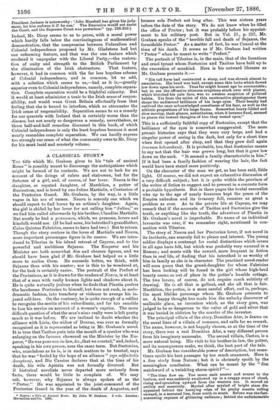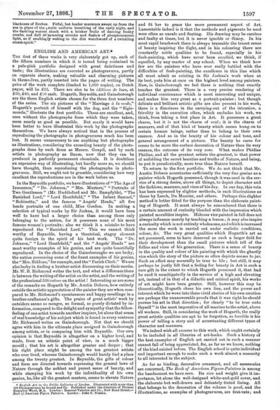A CLASSICAL STORY.* THE title which Mr. Graham gives to
his "tale of ancient :Rome" is possibly meant to discourage the anticipations which might be formed of its contents. We are not to look for an account of the doings of rulers and statesmen, but for the fortunes of a girl, and, of course, of her lover. Nesera is the -daughter, or reputed daughter, of Masthlion, a potter of Surrentnm, and is loved by one Julius Martialis, a Centurion of the Prastorian Guard. Mr. Graham, by the way, is a little vague in his use of names. Nemra is scarcely one which we should expect to find borne by an artisan's daughter. Again, the girl is chided by her lover for not calling him "Julius," as we find him called afterwards by his brother, Claudius Martialis. But surely he had a prcenomen, which, we presume, lovers and kinsfolk would use. (If he had none, his betrothed's grandfather, Caius Quintus Fabricius, seems to have had two.) But to return. Though the story centres in the loves of Martialis and Neon-a, more important personages figure in its course. We are intro- duced to Tiberius in his island retreat of Capreas, and to the powerful and ambitious Sejanns. The Emperor and his Minister are both somewhat dim and obscure figures, and we -should have been glad if Mr. Graham had helped us a little more to realise them. He succeeds better, we think, with Sejanns than with his master; nor is this to be wondered at, for the task is certainly easier. The portrait of the Prefect of the Prsetorians, as it is drawn for the readers of Necera, is at least that of a man with really human lights and shadows about it. He is quite naturally jealous when he finds that Plautia prefers the handsome Prffltorian to himself, but does not rush, in melo- dramatic fashion, into treachery or violence to avenge his in- jured self-love. On the contrary, he is quite enough of a soldier to recognise the merits of his subordinate, and far too sensible to lose his service on account of a woman's caprice. The more -difficult question of what the man's aims really were is left pretty mach as it was before. We are inclined to doubt whether the alliance with Livia, the widow of Drusus, was ever as formally recognised as it is represented as being in Mr. Graham's noveL It is true that Tacitus puts into the mouth of a speaker who was enlarging on the favours showered on the Minister by the Em- peror, "He was your son-in-law, &c., that we courted," and, indeed, speaking in his own person, uses the same term. But Snetonins, who, scandalous as he is, is in such matters to be trusted, says
that he was "fooled by the hope of an alliance" adfinitatie -deceptum), and Dio Cassias declares that at the time of his death, his wife Apicata was not formally divorced. But if historical novelists never departed more seriously from
-facts, there would be little to complain of. We may ask, however, why Sejanns is always spoken of as the -6‘ Pretor." He was appointed to the joint-command of the Prsetorian Guard in the year of the death of Augustus, and
• Mara: a Tale of Ancient Rome. By dobn W. Graham. 2 vols. London : ,Macmillan and Co. 1886.
became sole Prefect not long after. This was sixteen years before the date of the story. We do not know when he filled the office of Prwtor ; but it was probably before his appoint- ment to his military post. But in Vol. II., p. 257, Mr.
Graham speaks of the "terrible fall and death of Sejanus, the formidable Pretor." As a matter of fact, he was Consul at the time of his death. It seems as if Mr. Graham had written " Pretor " when he meant to write "Prefect."
The portrait of Tiberius is, in the main, that of the licentious and cruel tyrant whom Snetonius and Tacitus have held up to the execration of mankind. Here is his outward likeness as Mr. Graham presents it :—
"His tall form had contracted a stoop, and was shrunk almost to emaciation. His head was bald, except some thin locks which flowed low down upon his neck. Thus far might honest age be accountable; but to see the offensive ulcerous eruptions stuck over with plaster, which blotched his pale face, was to awaken suspicion of polluted habits. Yet from the midst of this unattractive physiognomy there shone the undimmed brilliance of his large eyes. Their beauty had outlived the once acknowledged comeliness of his face, as well as the athletic proportions of his large frame. Somewhat heavy-lidded and slow-moving, their glance, nevertheless, when it became fixed, seemed to pierce the inward thoughts of him they rested upon."
This is a sufficiently faithful copy of Snetonius, except that the brilliance of the eyes is somewhat exaggerated. The more prosaic historian says that they were very large, and had a singular power of seeing in the dark, but only for a short time when first opened after sleep, and that they grew dull again (runoff& hebesce,bant). It is probable, too, that Suetonius means to say not that the hair was grown long, but that it grew low down on the neck. "It seemed a family characteristic in him." If it had been a family fashion of wearing the hair, the fact would have been stated more positively.
On the character of the man we get, as has been said, little light. Of course, we did not expect an exhaustive discussion of a very difficult subject; but it is quite within the province of the writer of fiction to suggest and to present in a concrete form a probable hypothesis. But in these pages the brutal sensualist who up to the age of nearly fourscore kept the peace of the Empire unbroken and its treasury fall, remains as great a problem as ever. As to the private life at Capreas, we may remark that if the accounts of Tacitus and Suetonins give the truth, or anything like the truth, the adventure of Plautia in Mr. Graham's novel is improbable. No name of an individual favourite was ever, if we remember right, mentioned in con- nection with Tiberius.
The story of Nesera and her Prsetorian lover, if not novel in its incidents, can scarcely fail to please and interest. The young soldier displays a contempt for social distinctions which lovers in all ages have felt, but which was probably very unusual in a Homan; and meets with the reward, more frequent in fiction than in real life, of finding that his betrothed is as worthy of him in family as she is in character. The practised novel-reader will soon guess that the grand-daughter for whom Fabricius has been looking will be found in the girl whose high-bred beauty seems so out of place in the potter's humble cottage.
The two lovers, of course, do not, require much subtlety of drawing. He is all that is gallant, and she all that is fair. Masthlion, the potter, is a more careful effort, and is, perhaps, the most lifelike personage whom Mr. Graham presents to us. A happy thought has made him the unlucky discoverer of malleable glass, an invention which, as the story goes, was judged to be so dangerous to the value of gold and silver that it was buried in oblivion by the murder of the inventor.
The principal villain of the story, Domitius Ater, is drawn on the usual lines of a villain of romance, and calls for no remark. The name, however, is not happily chosen, as at the time of the story, there was a real Domitius Afer, a very different person from his imaginary namesake. The second villain, Cestus, is a more natural being. His visit to his brother-in-law, the potter, and its consequences make, we think, the best part of the tale. Mr. Graham has considerable power ordescription, but some- times spoils his best passages by too much ornament. Here is a ,fine study from Nature ; but it is obviously spoilt by the meaningless conclusion. What can be meant by the "dim watchword of a twinkling storm-spirit "—
" The time flew on. The moon sank nearer and nearer to the horizon, and was suddenly swallowed up in a craggy mass of cloud, rising and spreading upward from the western sea. It moved on swiftly and massively. Myriad after myriad of bright stars dis- appeared behind the hurrying edge of its pitchy mantle rolling onward, in a serrated line, from north to south. Before was the fast- narrowing expanse of glittering radiance; behind the unfathomable
blackness of Erebus. Fitful, but louder murmurs swept up from the sea in place of the gentle uniform breathing of the early night, and the darkling waters shook with a brisker frolic of dancing frothy combs, and dull shrmtnering streaks and flashes of phosphorescent light, as if exultingly waking to the dim watchword of a twinkling storm-spirit."







































 Previous page
Previous page